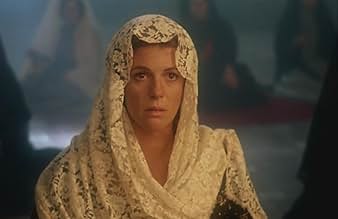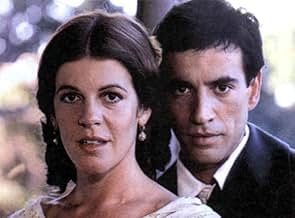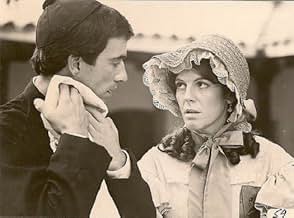NOTE IMDb
6,9/10
1,6 k
MA NOTE
Dans les années 1840 à Buenos Aires, en Argentine, une belle jeune mondaine nommée Camila tombe amoureuse de Ladislao, un prêtre. Après plusieurs tentatives pour combattre ses propres sentim... Tout lireDans les années 1840 à Buenos Aires, en Argentine, une belle jeune mondaine nommée Camila tombe amoureuse de Ladislao, un prêtre. Après plusieurs tentatives pour combattre ses propres sentiments, il succombe finalement à elle.Dans les années 1840 à Buenos Aires, en Argentine, une belle jeune mondaine nommée Camila tombe amoureuse de Ladislao, un prêtre. Après plusieurs tentatives pour combattre ses propres sentiments, il succombe finalement à elle.
- Réalisation
- Scénario
- Casting principal
- Nommé pour 1 Oscar
- 2 victoires et 2 nominations au total
Avis à la une
This melodrama directed by Maria Luisa Bemberg is a story of a passionate woman who wants nothing more than to pursue her desire for love and life. The movie shows the audience the importance of the church and social classes and enables us to view the attitudes and emotions of people living during the dictatorship of Juan Manuel de Rosas. However, it is evident that Bemberg has a slight bias in that the movie is seen through the eyes of Camila O'Gorman. This film is a wonderful example of how the movies intend to manipulate the viewer, allowing Camila to have all the rights and giving none to Rosas is rather biased. The film strongly emphasizes the dictatorship of Rosas and the viewer is given the opportunity to see the profundity and power of this dictator.
"Camila" is a love story that is based on true events. It is a unique movie in that it draws the audience to it with the promise of passion, but it keeps the audience intrigued with its historical representation of Rosas' Argentina. The forbidden love affair between Camila, the daughter of a wealthy land owner, and Ladislao, a young priest, is defeated by the intensity of Argentina's patriarchal society. Maria Luisa Bemberg's presentation of the power of Rosas' regime is historically accurate, as is her depiction of the passion and independence of Camila.
10syt48-1
"Camila" takes place in Buenos Aires, Argentina (1847-1848) during the tyrannic rule of Governor Juan Manuel de Rosas. The film recounts the tragic true story of Camila O'Gorman, a 19 year old socialite, who falls madly in love and runs away with a young Jesuit Priest, Ladislao Gutierrez. For a few months they were able to live happily as man and wife in a small village near the border of Brazil where they worked as school teachers. Respected by all who knew them, and unaware of their real identity, Camila and Ladislao were eventually recognized by a priest and captured. Imprisoned and executed without a trial by Rosas' orders, their bodies were placed together in a double coffin. At the time of her death Camila was eight months pregnant (but, perhaps due to censorship the film alters that fact) and her execution, along with Ladislao's, prompted the downfall of Rosas' reign.
This is a story that goes beyond doomed love, but also focuses upon personal and political freedom. Susu Pecoraro (Camila), who bares a strong resemblance to the real Camila, and Imanol Arias (Ladislao) are magnificent. This film is a masterpiece!
This is a story that goes beyond doomed love, but also focuses upon personal and political freedom. Susu Pecoraro (Camila), who bares a strong resemblance to the real Camila, and Imanol Arias (Ladislao) are magnificent. This film is a masterpiece!
A former friend of mine, who was very much into foreign films, "accidentally" rented this movie for both of us to watch after the dissolution of my relationship with a Jesuit, in 1999. Perhaps she was trying to assure me that I was better off now, because I would not be shot by a firing squad for having slept with a priest? Never mind that I was being treated for post-traumatic stress disorder and was suffering through nightmares of Jesuits trying to murder me and make it look like suicide. After watching this movie, I was left numb and freaked-out by the residual irrational feeling that Camila might have been me in a former life?
Nine years later, I'm more able to assess the movie apart from my own experience of the Catholic priesthood and its extremely misogynistic tendencies. I admire Camila for having had a strong mind and will of her own, but I would tell her or any other woman involved with a priest that these men just aren't worth our sacrifice of self for their sakes, much less martyrdom.
Nine years later, I'm more able to assess the movie apart from my own experience of the Catholic priesthood and its extremely misogynistic tendencies. I admire Camila for having had a strong mind and will of her own, but I would tell her or any other woman involved with a priest that these men just aren't worth our sacrifice of self for their sakes, much less martyrdom.
This film is about a doomed relationship between the daughter of a rich fascist-type landowner in Argentina about 1830 or so (after the successful revolution against the Spanish). The new government, it seems, feels that the end justifies the means and repression is used to keep control of the fledgling nation.
Camila finds that she is not attracted to the macho rich suitors but instead finds herself drawn to the new Jesuit priest. Despite common sense and many obstacles, they run off together. What I found most interesting in the movie was the character of her father, who was instrumental in tracking them down and exacting punishment.
In many ways, the plot reminded me of The Thorn Bird mini-series combined with a fascist-like backdrop. A pretty good film overall. Be aware, however, of the nudity. It's NOT as much as you might expect in such a film but considering he's a priest, it's bound to offend some.
Camila finds that she is not attracted to the macho rich suitors but instead finds herself drawn to the new Jesuit priest. Despite common sense and many obstacles, they run off together. What I found most interesting in the movie was the character of her father, who was instrumental in tracking them down and exacting punishment.
In many ways, the plot reminded me of The Thorn Bird mini-series combined with a fascist-like backdrop. A pretty good film overall. Be aware, however, of the nudity. It's NOT as much as you might expect in such a film but considering he's a priest, it's bound to offend some.
Le saviez-vous
- AnecdotesThis is the second Argentine film to be nominated for an Academy Award for the 'Best Foreign Language Film' in 1985.
- Citations
Ladislao Gutiérrez: I'm listening, Camila. Talk.
Camila O'Gorman: I'm dying of love, father.
- ConnexionsReferenced in There's Nothing Out There (1991)
Meilleurs choix
Connectez-vous pour évaluer et suivre la liste de favoris afin de recevoir des recommandations personnalisées
- How long is Camila?Alimenté par Alexa
Détails
Contribuer à cette page
Suggérer une modification ou ajouter du contenu manquant


















